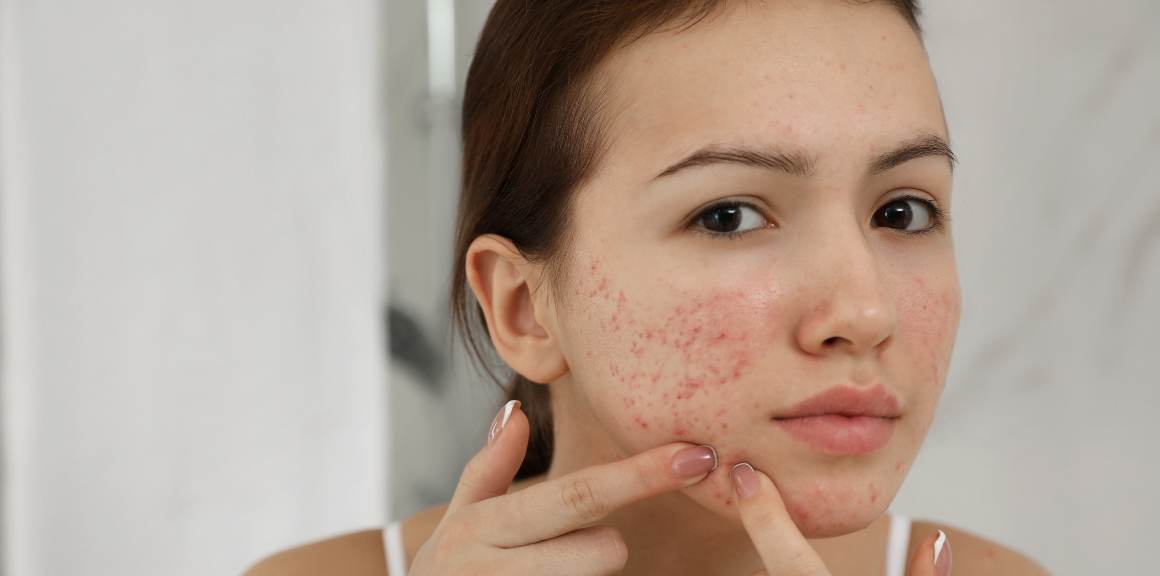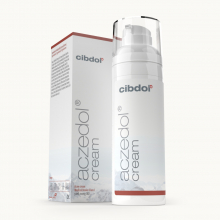What Age Does Adult Acne Stop?
Published:
Acne is a common skin condition that can continue well beyond the teenage years. Many adults deal with acne breakouts, wondering when it will finally go away. So what age does adult acne stop?
Contents:
- Acne Can Persist Through Adulthood
- Acne Triggers Change With Age
- Acne Lasts Longer for Some Adults
- How Long Does Acne Last?
- Acne Treatment Evolves Over Time
- Maintaining a Consistent Skincare Routine
- Can Acne Really Go Away Permanently?
- The Takeaway: Acne Can Recur Lifelong
- Frequently Asked Questions About Adult Acne
- What causes acne in adults?
- What is the best way to treat adult acne?
- How long does it take to clear up adult acne?
- Does acne go away with age?
- What reduces or prevents adult acne?

Acne Can Persist Through Adulthood
For most people, acne begins during puberty and lasts into their 20s. But for many adults, acne continues affecting their skin into their 30s, 40s, and even 50s.
Acne is caused by several factors like hormones, genetics, diet, stress, and medication side effects. As we age, hormonal changes and life stressors can trigger acne flares. Excess oil production, skin cell buildup, bacteria growth, and inflammation lead to breakouts.
So acne does not necessarily stop at a certain age. It can come and go throughout adulthood. The American Academy of Dermatology estimates acne affects up to 15% of women in their 50s.
Acne Triggers Change With Age
What causes acne evolves as we get older. Different factors tend to trigger breakouts during certain life stages:
20s: Hormonal fluctuations around the menstrual cycle often cause acne in women during their 20s. Stress from education, careers, and relationships can also contribute.
30s: Pregnancy leads to surging hormones that frequently cause acne breakouts. Discontinuing birth control pills can also trigger acne in women in their 30s.
40s: Perimenopause leads to hormonal imbalance, while stress stays high for many during their 40s. These factors lead to acne flares.
50s: Menopausal hormone changes drive breakouts for many women in their 50s. Medications like steroids are another culprit.
So while acne triggers change over time, breakouts can continue occurring. The causes differ across each decade of adulthood.
Acne Lasts Longer for Some Adults
While acne eventually clears up for most adults, it persists longer into adulthood for others. Studies show genetic factors cause some people to continue battling acne well into middle age.
Their skin is simply more prone to the oil production, skin cell buildup, and inflammation driving breakouts. Hormones, stress, and other factors then exacerbate the acne.
Additionally, some adults have treatment-resistant acne vulgaris that is difficult to control. Their breakouts are recalcitrant to over-the-counter medicines and common prescription treatments.
For these adults, acne lasts longer without tailored treatment plans. Severe acne like cystic acne also lingers without customized therapy.
How Long Does Acne Last?
So when does acne finally stop? There is no definitive age when acne goes away completely. But here is an overview of how long acne tends to last for most people:
- Teens: Acne often starts around puberty and can last into the 20s.
- 20s: Acne persists for some but improves for most people in their 20s.
- 30s: Breakouts caused by hormones and stress affect some adults in their 30s.
- 40s: Acne flares sporadically during perimenopause and remains treatment-resistant for some.
- 50s: Acne related to menopause, medications, and genetics continues plaguing some adults.
- 60s: Acne rarely affects people in their 60s unless triggered by medications or health conditions.
While acne can theoretically occur at any age, it tends to finally clear up for most people by their 60s. But the course of acne is highly variable between individuals.
Acne Treatment Evolves Over Time
As we age, different acne treatment approaches become preferable to account for changing skin. Here is an overview:
- Teens: Over-the-counter acne treatments like salicylic acid or benzoyl peroxide help clear adolescent acne. Retinoids like tretinoin and adapalene are also effective.
- 20s: Topical retinoids remain helpful for acne in the 20s. Oral antibiotics or birth control pills may also combat breakouts.
- 30s: Hormonal treatments like spironolactone or oral contraceptives can treat acne caused by shifting hormones. Light chemical peels enhance results.
- 40s: Anti-aging ingredients like retinoids and alpha hydroxy acids prevent acne while addressing skin aging concerns. Professional extractions and photodynamic therapy provide extra help.
- 50s: Limiting glycolic acid chemical peels and transitioning to gentler options like salicylic acid peels prevents irritation of mature skin. Oral isotretinoin or hormonal therapies are still beneficial if acne is severe.
The right acne treatment approach improves breakouts at any age while accounting for aging skin concerns. Seeking professional guidance ensures appropriate therapy.
Maintaining a Consistent Skincare Routine
Persistence is key when battling acne at any age. Maintaining a steady skincare routine with acne-fighting ingredients reduces breakouts over time.
Daily cleansing, applying acne products, moisturizing, and wearing sunscreen help get acne under control and keep skin clear. Avoid picking and popping pimples to prevent scarring.
Consistent skincare paired with professional treatment when needed keeps acne away for longer. But some acne may always recur due to genetics and shifts in hormones or stress.
Can Acne Really Go Away Permanently?
Acne ultimately never permanently “goes away” for most people. The factors causing acne can't be eliminated entirely.
Even if acne seems to finally stop, it can still randomly recur. Stress, hormones, travel, or other factors can trigger surprise breakouts.
But with the right treatment approach tailored to your age, acne can be controlled and only occur occasionally. And gentle skincare keeps skin clear daily.
While acne may never permanently disappear, it can be managed successfully over time. The key is adapting your care as your skin and acne triggers evolve.
The Takeaway: Acne Can Recur Lifelong
There is no definitive age when acne completely goes away or "stops" forever for all adults. The course of acne is variable based on genetics, hormones, and other factors.
Breakouts typically clear up by the 60s but may still occur sporadically. Acne often lasts longest for those with family history and treatment-resistant acne.
Adapting your skincare routine and acne treatment approach helps control breakouts as you age. But acne can recur to some degree lifelong due to shifts in hormones, stress, or other triggers.
Consistency is key for managing acne throughout adulthood. Seeking professional guidance ensures you use the most suitable acne treatments for your age and skin concerns.
While acne may come and go, taking the right care of your skin daily keeps breakouts away for longer periods. With a strategic skincare routine, acne does eventually “stop” for longer stretches as you mature.
Frequently Asked Questions About Adult Acne
Acne is a common skin condition that can continue affecting adults of all ages. Here are answers to some frequently asked questions about dealing with acne as an adult.
What causes acne in adults?
There are several potential causes of adult acne:
- Hormones - Fluctuations in androgens can increase oil production and trigger breakouts. This includes hormonal changes related to menstrual cycles, pregnancy, perimenopause, and menopause.
- Medications - Certain medications like corticosteroids, lithium, androgens, or birth control pills may cause acne flares.
- Stress - High stress levels raise cortisol and can worsen acne.
- Genetics - Genes leading to oily skin or increased inflammation make acne more likely.
- Diet - Foods with high glycemic loads, milk products, or whey protein may be acne triggers for some people.
- Skin care - Harsh cleansers, occlusive products, and picking can worsen acne.
What is the best way to treat adult acne?
The best acne treatments for adults include:
- Over-the-counter topicals - Benzoyl peroxide, salicylic acid, glycolic acid, and retinoids like adapalene can effectively treat mild acne.
- Prescription topicals - Stronger retinoids like tretinoin and tazarotene help clear up moderate inflammatory acne.
- Oral antibiotics - Antibiotics like doxycycline, minocycline, and lymecycline reduce bacteria on the skin and decrease inflammation.
- Oral contraceptives - Birth control pills can reduce androgens and hormone fluctuations contributing to acne.
- Spironolactone - This oral medication blocks androgens and is effective for hormonal acne in women.
- Isotretinoin - For severe, scarring, or treatment-resistant acne, isotretinoin provides dramatic clearing.
- Procedures - Professional extractions, chemical peels, photodynamic therapy, and laser treatments enhance results.
Working with a dermatologist helps determine the right acne treatment plan based on your skin and breakouts. Combining multiple therapies often yields the best outcome.
How long does it take to clear up adult acne?
Most acne treatments take 6-12 weeks to start improving acne significantly. Here is how long it takes some common treatments to work:
- Over-the-counter topicals: 4-8 weeks
- Topical antibiotics: 6-10 weeks
- Oral antibiotics: 6-12 weeks
- Isotretinoin: 16-20 weeks
- Spironolactone: 4-6 months
Severe or cystic acne may take longer to fully clear. A customized acne treatment plan combining several therapies clears acne faster. Most importantly, consistency is key when treating adult acne. Using products daily as directed leads to the best results over time.
Does acne go away with age?
There is no specific age when acne completely goes away for all adults. Acne often clears up for most people by their 60s but can still occur sporadically due to hormonal changes and stress.
For some adults, acne persists well into middle age due to genetics, hormones, or treatment resistance requiring specialized care. While acne may wax and wane, maintaining a daily skincare routine helps control breakouts.
What reduces or prevents adult acne?
Some tips to manage and prevent adult acne include:
- Cleanse skin gently twice daily with non-irritating cleansers.
- Apply acne-fighting ingredients like retinoids, benzoyl peroxide, or salicylic acid daily.
- Avoid touching or picking at the face to limit bacteria spread.
- Take makeup off thoroughly every evening.
- Manage stress levels through exercise, meditation, therapy, or other methods.
- Consider dietary changes like limiting dairy or foods with high glycemic loads if they may trigger breakouts.
- Talk to your doctor about adjusting medications that may worsen acne.
- See a dermatologist if over-the-counter options don't improve acne after 2-3 months.
While adult acne can be frustrating, working with a dermatologist to find the right treatment plan helps manage this condition. Consistency with daily skincare and acne treatments keeps breakouts away for longer periods.















